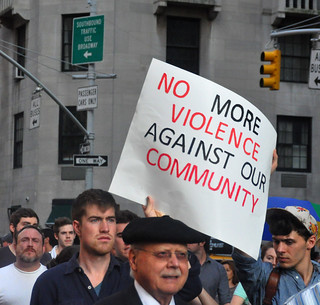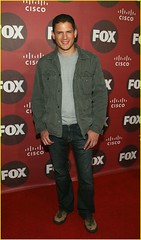"I hate, I despise your festivals,
and I take no delight in your solemn assemblies.
Even though you offer me your burnt-offerings and grain-offerings,
I will not accept them;
and the offerings of well-being of your fatted animals
I will not look upon.
Take away from me the noise of your songs;
I will not listen to the melody of your harps.
But let justice roll down like waters,
and righteousness like an ever-flowing stream."
and I take no delight in your solemn assemblies.
Even though you offer me your burnt-offerings and grain-offerings,
I will not accept them;
and the offerings of well-being of your fatted animals
I will not look upon.
Take away from me the noise of your songs;
I will not listen to the melody of your harps.
But let justice roll down like waters,
and righteousness like an ever-flowing stream."
- AMOS 5:21-24
It's days like this that it's embarrassing to be a Christian.
How am I supposed to be a proud member of the institution whose ranks include a woman who compares waterboarding (a brutal form of torture), to baptism, our most sacred and widely-recognized sacrament?
How am I supposed to seek unity or concord with a self-proclaimed archbishop in our own "civilized" country who -- when pressed -- refused to condemn the draconian new laws in Africa and Nigeria that not only make the simple condition of being gay (which is not something one chooses) a criminal offense punishable by arrest, abuse and (in some places) death, but compels the entire populace to take part in a witch hunt against the same, or face similar mob justice?
How do I accept the leadership of the titular head of my own church, who would use very shaky evidence of a connection between mass murder in a country torn by civil war and the progress western churches have made on sexual and gender justice, as a rationale for keeping his own province in the past as the country around them moves forward, further cementing its increasing irrelevance?
How do I explain this to the people I encounter (either LGBT themselves or just believing in equal rights) who have a deep (and deserved) distrust of religious institutions in general and the church in particular?
The simple answer is, I can't.
I hereby declare myself "out of communion" with those who would use Christ and the Bible as a weapon against those around them. I concede that what is broken between us cannot be fixed. You can't be taken seriously when using "Biblical authority" as a rationale for endorsing continued persecution and murder. If you don't see the defense of one vulnerable member of the human family as equally important to another, then -- frankly -- I'm not sure what Gospel you're reading, but it's not the one I know.
Your "Christian cred" is hereby null and void here at the Church of Me if you
think sinking to the level of torture is the way to make terrorism stop,
and then glorify it by comparing it to the joyful initiation into the Body of Christ. You cannot wash away another's sins while there is blood on your hands.
I cannot control what my denomination or the communion of which it is part does or says, or fails to. Archbishop Welby claims that Christians might suffer at the hands of the intolerant if the church continues to move forward. I fail to recall an instance where Christ promised the road of discipleship would be an easy one. I am blessed to live in a place where we have grown so used to feeling included that we take it for granted, and a large part of the conversation is reminding those who "got theirs" that there is still work to be done. I urge my similarly comfortable brothers and sisters to look at the world and the church outside your doors, pick up the rope and help us soldier on.
I only know that -- for me -- I can no longer be at peace with the notion that others identify me as part of an institution that is capable of what I've seen done in its name. I will continue to bore and annoy people by talking about it as long as I have a voice. I wish our leaders would put the radical inclusion that Christ preached ahead of politics and the facade of unity, an altar at which fairness and progress have been sacrificed so many times. I thank God for the opportunity to break bread with prophetic voices like the Rev. Winnie Varghese, the Rev. Canon Susan Russell, Louie Crew-Clay, and Jim Naughton, who have spoken truth to power many times when it was inconvenient or even dangerous to do so. They are the reason I have found it possible to stay at the table when my head and my heart have told me to walk away.
We have much to be grateful for, and I know on one level that what we are seeing is the inevitable "growing paints" of progress. But for today, I can't help but believe that the Almighty looks down at our folderol, especially at this time of year, and shakes his head, wondering, "when will they ever learn?"
I only know that -- for me -- I can no longer be at peace with the notion that others identify me as part of an institution that is capable of what I've seen done in its name. I will continue to bore and annoy people by talking about it as long as I have a voice. I wish our leaders would put the radical inclusion that Christ preached ahead of politics and the facade of unity, an altar at which fairness and progress have been sacrificed so many times. I thank God for the opportunity to break bread with prophetic voices like the Rev. Winnie Varghese, the Rev. Canon Susan Russell, Louie Crew-Clay, and Jim Naughton, who have spoken truth to power many times when it was inconvenient or even dangerous to do so. They are the reason I have found it possible to stay at the table when my head and my heart have told me to walk away.
We have much to be grateful for, and I know on one level that what we are seeing is the inevitable "growing paints" of progress. But for today, I can't help but believe that the Almighty looks down at our folderol, especially at this time of year, and shakes his head, wondering, "when will they ever learn?"






